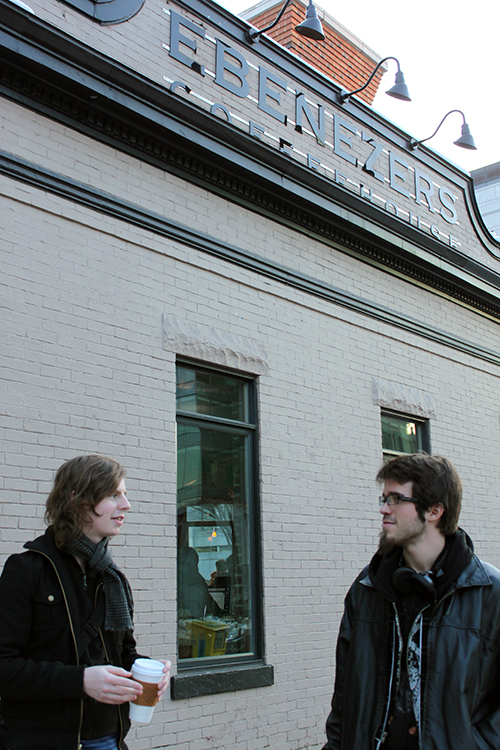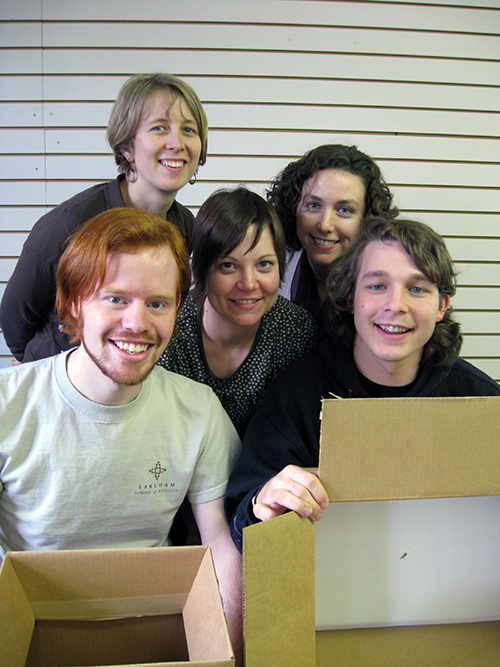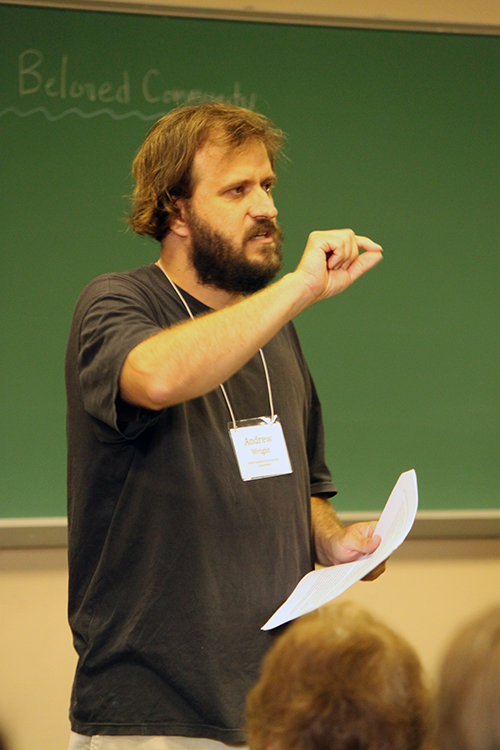 As a new Quaker, whenever I had a question about my faith, more experienced Friends at my Meeting would recommend a book or pamphlet I should read. I was inspired by stories about the profound awakenings and prophetic ministry of my spiritual ancestors, and over time I came to trust my sense of spiritual intuition, developing an increasingly deep relationship with God. I grew a lot just by waiting in the silence and listening for the inward voice of the Spirit.
As a new Quaker, whenever I had a question about my faith, more experienced Friends at my Meeting would recommend a book or pamphlet I should read. I was inspired by stories about the profound awakenings and prophetic ministry of my spiritual ancestors, and over time I came to trust my sense of spiritual intuition, developing an increasingly deep relationship with God. I grew a lot just by waiting in the silence and listening for the inward voice of the Spirit.
Yet at the same time, I felt something was missing. There was this yearning that could not be filled by pamphlets, nor even the weekly training of silent worship. What could answer this aching need to lead a life of faithfulness like the ones I read about? What did I have to do to live in the light, life and power that I saw glimmers of in worship?
For many years, I sought this something more outside of my local community. I traveled to an international Quaker gathering and visited a wide variety of Yearly Meetings and Quaker conferences. I even organized some of them. Not to mention that I spent several years away from my Meeting, studying at Earlham School of Religion in Richmond, Indiana.
 I benefited immensely from these experiences. The opportunity to attend seminary, in particular, was a transformational undertaking. With each Friends gathering I attended, I felt that I was rediscovering and integrating a bit more of the living tradition of Quakerism that is scattered across our communities in North America. In many ways, the only way to get the kind of training I needed was to leave my local community.
I benefited immensely from these experiences. The opportunity to attend seminary, in particular, was a transformational undertaking. With each Friends gathering I attended, I felt that I was rediscovering and integrating a bit more of the living tradition of Quakerism that is scattered across our communities in North America. In many ways, the only way to get the kind of training I needed was to leave my local community.
I know that there must be many folks who became Quakers and developed into fully-grown leaders without needing to spend much time away from their local church. Nevertheless, it is my observation that many of the outstanding Quaker ministers today have felt it necessary to spend a huge amount of time moving around in seminary-like environments – whether literally at a seminary, in programs like School of the Spirit, or at gatherings, consultations and conferences. For most of us – my 20-something self included – the local church environment is experienced as being inadequate for preparing and equipping new leaders for the work that God is calling them to.
This is new. For most of our history, Friends have trained up our leaders within the local church. It was generally only once a minister was already well-prepared that she was encouraged to venture beyond her home Meeting. In contrast to those Christian communities that called seminary-trained pastors from beyond the local congregation, Friends have traditionally expected that the gifts a community needed would arise within that community. Our leaders have been home-grown, raised up from the grassroots.

Today, this may not be realistic for many of our congregations. The Quaker community faces immense cultural and demographic challenges, and many local groups may no longer have the internal resources to cultivate their own leaders. In my personal case, I do believe that going to seminary and traveling widely among Friends was probably the best way for me to get the education I needed to learn what our tradition is really about. I am thankful that these resources were available for me.
But should my path be the norm? Should our most passionate, inspired new leaders feel like the only way for them to grow is to leave the local community? Might there be a way that our local communities could provide a path for leadership development, spiritual gift assessment, and discernment around how Jesus is calling us to become living members of his body, right where we are? What if sending one of our leaders to seminary was seen as a culmination of a process of local development? What if our seminarians were expected to come back prepared to equip others with the education they received?
Could our local fellowships become places where the gifts that God plants find water and encouragement to grow?
These are really interesting questions, Micah. I have definitely followed the pattern of “moving around in seminary-like environments.” I don’t know that that is a bad thing, though. Like you, many of the places where I have learned the most and found Life in the Religious Society of Friends are where we come together across branches and theological differences.
I have also found in traveling among Friends that ministers and elders feel the lack of “Second Day meetings,” a place for people who have committed themselves to ministry to worship together and hold each other in support and accountability. I wonder if the various conferences and gatherings and programs like the School of the Spirit are filling that need.
I’m not so sure Friends of yesteryear necessarily grew in the ministry (leadership) primarily through their local meeting. I think that most active Friends from that time routinely attended quarterly and yearly meeting sessions, where they interacted in worship and dialogue with Friends from other meetings within the larger Quaker circle of which their meeting was a part. No doubt, there were many opportunities to cultivate spiritual gifts through this routine interaction.
Also, Quakers of old had a strict discipline which was constantly enforced. So, the in’s and out’s of being a Quaker were quickly learned by newly convinced Friends. Too much “enforcement” in our day would be considered “cultish” and coercive, and let’s admit it will never happen. So, disciplines in our day are much more loosely enforced in even the most conservative Quaker groups. In liberal Quaker groups they are merely advices.
Most Friends no longer travel to quarterly or yearly meeting sessions. In fact, most only sporadically participate in their own local meeting. We have moved from being a communal religious society to a local place to sometimes connect with others briefly as they worship God in the Quaker tradition. I still believe that gifts of the Spirit are best cultivated through constant interaction with the Spirit at least weekly in ‘expectant waiting’ worship. “Be still and know I am God” still holds true.
The other dynamic afoot in our day is the inevitable physical relocation of Friends. A meeting can’t expect that a Friend who demonstrates any leadership, will be in their midst for long. So, we today experience a “catch it if you can” mentoring experience.
I think what is happening in our day is primarily the result of spiritual and social isolation; the same phenomenon that is happening in the world at large. Increasingly, electronic modes are supplanting face-to-face conversations and mentors. The opportunities that once occurred at quarterly and yearly gatherings for Quakers now happen electronically through blogs such as this. And most Quakers don’t participate in these. Plus, the impact is just not the same as the face to face variety. You are still pretty much left on your own after you log off the computer.
This leaves us today with only the once considered “unQuakerly” practice of paying someone to teach us what is Quaker through seminaries, workshops, and books. And even if we choose to go to yearly meeting sessions, we must pay to attend these. What would our Friends of old think of that? I venture to say they would view it as just another flavor of the “hireling ministry”.
So, all of this leaves me to think the “train has left the station”, and we are in a new world when it comes to cultivating Quaker leaders. A sort of limbo, maybe . . .
Many meetings are responding by becoming essentially self-help spiritual groups, where the cultivation of recognized and stabilized “leaders” is not considered a practical achievement – especially in unprogrammed meetings where spiritual leadership is not hired as an enticement to continue in that role. The best that can be hoped for by the local meeting is a circle of Friends who come together to experience the Spirit together and grow in it. The Quaker distinctives of ‘expectant waiting’ worship and ‘sense of the meeting’ decision-making become even more essential in today’s leaderless environment.
And I’m not so sure that’s a bad outcome, because now the only leader we are left with is the one we encounter in worship as we expectantly wait in silence for his Voice to speak to us. Maybe we have reached the time when we must look to the True Leader among us, because we have no other choice. Hallelujah!
I think one of the indicators of a healthy meeting is that it has at least two or three Friends who are well enough versed in the tradition to pass it on and who also have either the gift of eldership or the gift of teaching. So that is one requirement if we are to grow our leaders in our local meetings.
Another is a library good enough to meet a learner’s needs and/or support for buying resources. You can learn a lot by reading if someone points you in the right direction.
A third is a robust program of religious education. A fourth is a proactive culture of eldership, in which someone in the meeting is actively paying attention to the members and attenders with an eye for nurturing their spiritual gifts.
A fifth is a critical mass of Friends truly committeed to spirit-led vocal minisstry.
A sixth is a membership process that starts with attenders and really kicks into gear when they apply for membership
emergency. emerge.
Micah rocks the query-house once again. yah! The current form of ‘gathering’ ‘meeting’ and church-ing COULD be the places where the ‘God-plants’ freakin’ dry up and die. Or they could be the ‘thriving place’. What emerges ‘living’ and ‘thriving’ and ‘world changing’?? I contend that brutal Honesty becomes the ‘water’ for the truly desperate spirit. Matthew 5:3 (blessed are the total ‘beggars’ for spirit-help)
Gather the people and the leaders will RISE UP in the fire of new inspiration.
George Fox was willing to let reading of scripture and ‘spirit’ ‘cross pollenate’ the ‘stuck-ness’ of the church of England who clearly carried the ‘ancient wisdom’ in a box of stuffy brutality. His connections got broader and broader because of the starvation for ‘true connection’ with God. May the starving be brought in and the leadership be raised by Spirit from amongst the ‘unexpected friends’
What are regular people THIRSTY for? hearing. honesty. help.
watering by hearing God….. May our ‘rescue the meeting’ work begin with Revolutionary stuff that brings the suffering souls of computer land into communion. (ooops. ..no sacrament dude!) well into ‘koinonia’. yeah. There is a whole flippy WORLD of people who might just appreciate an invitation to ‘clear out commentary for God-voice’. A silent worship party. Invitations read like this
“come to silent worship party preceded by other worship forms. you dont have to believe, join or participate in order to ‘hear advice from God during gathered worship’. Do you need relationship advice? Do you need business advice? Do you need ‘peace of mind’ for your mental (cough..cough..!!) ‘disease’? Come to silent worship party. When human beings are together not in ‘meditation’ not in ’emptying’ but in the presence of ‘highest spirit who loves everybody’ you get stuff straight from SPIRIT that you wana write down in your ‘serious’ book.”
Watering by giving a chance for sober honesty…. All reasonable minds and business people are aware of ‘downsides’ and need honesty work. The grave epidemic of ‘webspeed intimacy’ that is quickly wrecking committed relationships has turned me into a different kind of ‘thirsty plant’. A different ‘hunger’ than finding a better way in the ‘gathered meeting’ forms has recently arisen in this friend. May the watering power of yeshua-crucifixion be applied to each one of us, in order to be dead honest about ’emotions and affections’ arising that threaten the committed relationship, the child and the family who are already beset by layers of poverty and longings.
Perhaps this is an oblique comment to the subject, The query motivated me, and by the Spirit, i ended up in the ‘harvest of new faces’ mode more so than the ‘addressing leadership modalities’. and i THANK YOU Micah, once again. continue. avanti!
Micah — Great questions! The questing/questioning/testing began when I attended my first meeting in Colorado, and met some amazing mentors … some were my profs at a state university. These Friends were not afraid to speak out about things they saw that might be improved — and they encouraged us, as students, to do likewise. These Friends invited us to share the “life of their meeting”, not so much in terms of structural ideas, but in terms of truly living the faith. At the time, we didn’t have a “yearly meeting” just a gathering. Some older Friends felt that having a yearly meeting might “quench the Spirit.” Looking back, they may have been correct.
The yearly meeting of which I am a part seems inclined to micro-manage spiritual (or any other) leadings, however… It’s almost as if some folks fear “letting go and letting God.” This is not what I’m called to do/be.
So, I do not feel called to stay put. I feel called into joyous faith that works with all others to honor the Other — the Ground of our being.
Looked you up, Micah. May God bless you in developing leaders!